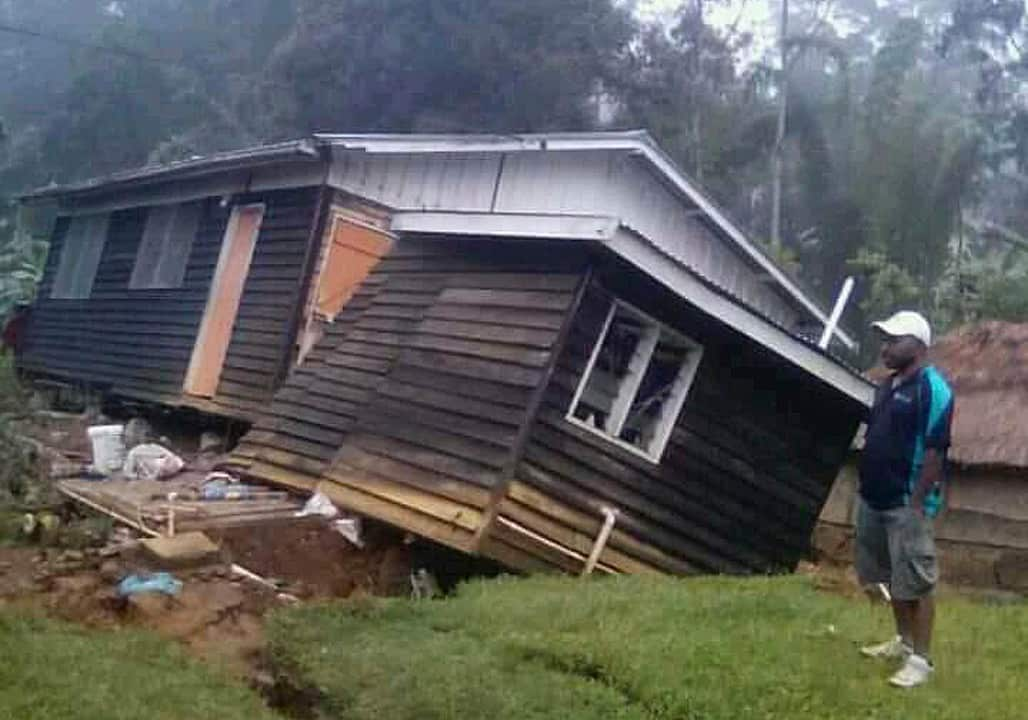At least 67 people were killed by a major earthquake that devastated Papua New Guinea's remote highlands last week, the Red Cross said Monday, with thousands homeless and without food and clean water.
The recovery effort has been slow as aid workers grapple with blocked roads and power outages to reach cut-off villages after the 7.5-magnitude quake struck on February 26 in the Pacific nation's mountainous interior.
Terrified locals in the Southern Highlands, Western, Enga and Hela provinces have also had to deal with strong aftershocks, including two 6.0-magnitude tremors early Monday.
Compounding the fallout was an announcement Monday that the impoverished country's biggest-ever development - the PNG LNG project operated by US energy giant ExxonMobil - will be offline for up to eight weeks as the quake-hit facilities undergo repairs.
"The death toll reported by the National Disaster Centre and disaster management teams on Friday is 67," the PNG country head of the International Federation of Red Cross and Red Crescent Societies Udaya Regmi told AFP from the capital Port Moresby.
"Around 143,000 people are affected and 17,000 people have been generally displaced because their homes are either fully or partially damaged and not in a condition to live in."
No official government death toll has been released.
Mr Regmi added that water and sanitation were major concerns for local communities, with relief workers unable to get bigger trucks carrying food through to some areas because of damage to roads by landslides.
Aftershocks rattle locals
“We haven’t slept. It’s been shaking all through the night,” said William Bando, provincial administrator of Hela Province, by telephone from Tari, about 40 km from where the shocks hit.
“What we experienced this morning could have caused more damage, but we don’t know ... it almost threw me out of bed.”
The strong tremors hit a region already badly damaged by the magnitude 7.5 quake that struck on February 26, the largest to hit the seismically-active highlands in nearly a century, triggering landslides, flattening buildings and closing oil and gas operations.
While the region has no major urban centers, around 670,000 people live within 100 km of the epicentre, according to the Red Cross.
At least 13 people were killed when hamlets nearest the epicenter were buried. Most of the other casualties were in the provincial capital of Mendi and the township of Tari, officials told Reuters. Aid agencies have said nearly 150,000 people remain in urgent need of emergency supplies.
Aid agencies have said nearly 150,000 people remain in urgent need of emergency supplies.

A man views a house that collapsed during February's strong quake in PNG. Source: AAP
Relief efforts are slowly being ramped up, with millions of dollars in aid pledged by the government, ExxonMobil and the Australian energy producers, Oil Search and Santos, involved in the gas project.
The Australian and New Zealand defence forces have began delivering aid, while the China Red Cross and Beijing have pledged financial assistance, according to the PNG Post-Courier.
Oil Search managing director Peter Botten, who travelled to the Highlands to survey the damage, said the impact "has been enormous, with many deaths in the region as well as the destruction of houses, schools, roads and bridges".
"Many communities are without basic necessities, such as food, clean water, shelter and medical support."
Prime Minister Peter O'Neill said last week the shutdown of the gas plant would have a "huge impact" on the economy, which is heavily dependent on its natural resources.
ExxonMobil PNG managing director Andrew Barry said production at the US$19 billion project would be restored as quickly as possible, adding that it was an "unprecedented event for the country" and the firm.
Share


